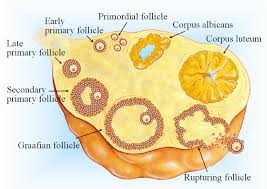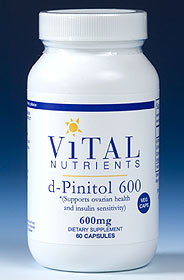Help Solve PCOS Puzzle with Vitamin D and Calcium
Vitamin D and calcium work hand-in-hand to promote PCOS-related ovarian health.
Free PCOS Newsletter
Normalization of Your Cycle

A number of studies have established a role for calcium in egg maturation and normal follicular development.
Vitamin D plays a crucial role in calcium absorption and regulation. A study conducted at Columbia University investigated whether vitamin D and calcium dysregulation contribute to the development of follicular arrest in women with PCOS, resulting in reproductive and menstrual dysfunction.
They studied 13 women who had chronic lack of ovulation, hyperandrogenism (excessively high male hormones) and vitamin D insufficiency. Nine had abnormal pelvic sonograms with multiple ovarian follicular cysts. All were hirsute, two had hair loss, and five had acanthosis nigricans.
Vitamin D combined with calcium supplementation resulted in normalized menstrual cycles within 2 months for seven women. Two became pregnant and the others maintained normal menstrual cycles. These data suggest that abnormalities in calcium balance may be responsible, in part, for the arrested follicular development in women with polycystic ovarian syndrome and may contribute to the pathogenesis of the disorder.
Vitamin D + Calcium Therapy Helps PCOS and Fertility
Shahid Sedughi University in Iran released a study of 100 infertile women with PCOS who were all taking 1,500 mg. of metformin.
The women were divided into two groups. One group took calcium 1000 mg/day and vitamin D 100,000 IU/month for six months. (IU = international units). The other group did not take any supplements.
So what happened by the end of six months? In the vitamin D and calcium group, body mass index improved, menstrual regularity increased, follicle maturation improved and fertility improved more than in the group who took nothing.
At the beginning of the study, an amazing 83% of the PCOS patients showed vitamin D deficiency, with 35% severely deficient. By the end of the study, 74% of these women had adequate vitamin D levels.
This study affirms earlier evidence that vitamin D adequacy is very helpful for improved fertility and for reducing most your other symptoms. This is why so much vitamin D is included in the d-Pinitol formula.
More Benefits
And here's another benefit of having enough vitamin D and calcium. The Harvard School of Public Health has reported that a decrease in overall risk of ovarian cancer was associated with high intake of total calcium. They also reported that intake of vitamin D was associated with reduced risk of endometrial cancer, but not ovarian cancer.
Regarding pregnancy, higher vitamin D levels were associated with reduced gestational diabetes, fewer C-sections, and reduction of preterm births, according to a study from Hospital Clinico San Carlos-IdISSC in Spain.
Two other recent studies have shown that vitamin D deficiency may be a contributing factor to insulin resistance and diabetes, both of which are problems for women with PCOS and contribute to ovarian dysfunction and absence of a normal cycle. These and other studies suggest that vitamin D plays a supportive role in the secretion, and possibly the action, of insulin. People with diabetes tend to have lower vitamin D levels.
The best place to get your vitamins and minerals is from your diet. However, diet is not enough. Our diet today is insufficient in some vitamins and minerals. Secondly, the presence of polycystic ovarian syndrome may increase your needs for certain nutrients, such as vitamin D, calcium, or inositol. So you'll want to take a look at supplementation.
Related Articles
Sources:
Thys-Jacobs S, et al, Vitamin D and calcium dysregulation in the polycystic ovarian syndrome, Steroids. 1999 Jun;64(6):430-5.
Firouzabadi RD et al, Therapeutic effects of calcium & vitamin D supplementation in women with PCOS, Complement Ther Clin Pract, 2012 May; 18(2):85-8.
Merritt MA et al, Dairy foods and nutrients in relation to risk of ovarian cancer and major histological subtypes, Int J Cancer, 2012 Jun 28; [Epub ahead of print].
Perez-Ferre N et al, Association of low serum 25-Hydroxyvitamin D levels in pregnancy with glucose homeostasis and obstetric and newborn outcomes, Endocr Pract, 2012 May 1:1-18.
Get Answers to your Questions about
- Fertility
- Weight Control
- Hair Loss
- Stress
- Unwanted Hair
- Acne...and more!
FREE PCOS Report
and Newsletter

Your email is safe with us. We respect your privacy, and you may unsubscribe at any time.
Recent Articles
-
PCOS Long Journey to The Happy End
Apr 30, 18 07:24 PM
Hi Girls, Maybe my story will have one day a good end but I am not there yet. Until I was 31 years old I lived my dream, having lovely husband, good -
PCOS and Miscarriage
Apr 17, 18 04:03 PM
Proper diet and natural supplements can help the body maintain a pregnancy through successful delivery.
-
How to Deal with PCOS and Stress
Apr 04, 18 04:19 PM
Your body has a natural capacity to heal itself if you provide it with the necessary tools.






